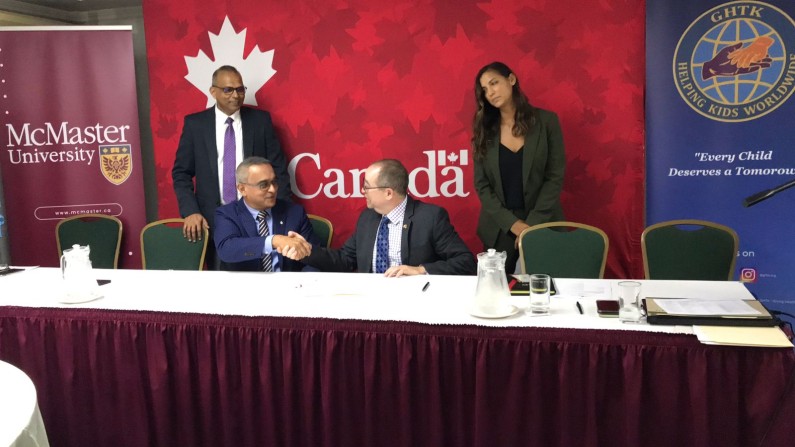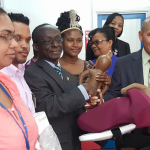
The Canadian High Commission together with the Ministry of Health launched a CAD$2.5 million Maternal, Newborn and Child Health Project today.
The five-year project, which is being funded by Global Affairs Canada, will be executed by McMaster University.
It is designed to improve the quality and availability of Maternal, Newborn and Child Health (MNCH) care in Regions One, Seven, Eight and Nine.
Ahead of signing the agreement with McMaster University, Canadian High Commissioner, Mark Berman said the project is a demonstration of Canada’s commitment to the empowerment of women and girls. He believes it will offer tremendous support to the maternal and child health activities currently being implemented by the Guyanese Government.
Mr. Berman noted that while the Health Ministry has been equipping health facilities with the necessary resources to provide safe deliveries and a conducive environment for babies and mothers, there are noticeable gaps in the system.
“But we do note, that there are still substantial pockets of the population that are unable to access quality MNCH services. That is precisely why this project was conceptualized. It is designed to target the most vulnerable populations in Guyana. Focus will be placed on increasing the access and quality of these critical health and support services to women and girls of Regions 1, 7, 8 and 9,” the Canadian High Commissioner explained.
It was explained that major emphasis will be placed on communities that maybe too far away from hospitals, which present a real challenge to women in need of immediate medical attention.
High Commissioner Berman noted that the implementing partners – McMaster University and Giving Health to Kids – will be working closely with the Ministries of Health and Local Government and Regional Development, the Georgetown Public Hospital Corporation and the University of Guyana, to ensure the successful execution of the project.
Minister of Health, Dr Frank Anthony said the project will build on the foundation laid more than a decade ago, which saw the introduction of neonatal services, and an increased focus on maternal and child health.
As of 2019, Guyana’s maternal mortality ratio was 169 per 100,000 live births, while the child mortality rate was 28 per 1,000 live births. In the case of neonatal mortality, the rate, according to the World Health Organization, was 17 per 1000 live births.
Advisor to the Health Minister, Dr Leslie Ramsammy said while progress was made when compared to the 1990s, more work needs to be done. He said Guyana will not be able to achieve its Sustainable Development Goals (SDGs) unless its indicators for maternal and child mortalities are dramatically improved from what it is today.
“No strategy or plan that we put together to bring Guyana’s life expectancy to the same as what exists in CARICOM will succeed unless we have a robust programme to ensure that mothers could deliver their babies safely and that we are able to keep our babies alive,” Dr Ramsammy said.
Dr. Ramsammy admitted that the services provided to hinterland communities require improvement, and the project will aid in that regard.











You must be logged in to post a comment Login